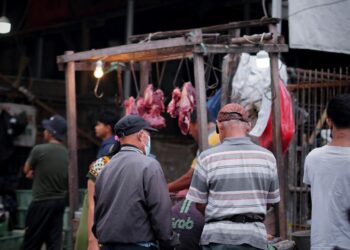Ismail Khozen
Senior Policy Analyst at Pratama-Kreston Tax Research Institute.
Since Kevin Kwan’s international bestseller novel Crazy Rich Asians was published in 2013 and adapted into a film in 2018, the term “crazy rich” has gained widespread popularity. Numerous celebrities, such as TV stars and influencers, have not hesitated to flaunt their extravagant lifestyles on social media. The media and netizens then describe these people as crazy rich.
At least seven Indonesians have become well-known as crazy rich on social media. Indra Kenz and Doni Salmanan are two of them. Indra Kenz is known as Crazy Rich Medan, while Doni Salmanan as Crazy Rich Bandung. Unfortunately, these two names have been linked to money-laundering cases. They have been charged with fraud by the National Police’s Criminal Investigation Department for setting up fraudulent investments through so-called binary options trading platforms.
Binary options trading operates similarly to gambling but with the added benefit of current digital technologies. What is worrying is that these platforms have been found to have engaged in systemic fraud.
The crazy rich affiliates are allegedly supplied with false balances by brokers (app owner/developer) to entice new traders (members under an affiliate). When members achieve huge profits, the broker is likely to block their accounts and take their funds. The broker can also control candlesticks, which members use as a tool while making trades.
Affiliates may earn up to 70 percent of the nominal amount staked by the losing members. They utilize these shares to keep the membership going. Brokers and affiliates clearly want to restrict members’ profitability, diverting money from circulation to their accounts.
We wonder why the government was so late to uncover this fraudulent trading. The 2010 Money Laundering Law mandates financial service providers such as banks to report suspicious transactions to the Financial Transactions Report and Analysis Centre (PPATK). Suspicious transactions include those that fall outside the customer’s general profile. Such reports, which are supposed to be filed with the National Police, the Attorney General’s Office and the Corruption Eradication Commission (KPK), should have alerted law enforcement agencies early on to detect such fraudulent activity.
The Directorate General of Taxes also should have acted to immediately audit the annual tax returns of the so-called crazy rich individuals who blatantly displayed their wealth through social media. If the tax auditors had investigated the crazy rich they could also have been able to detect the fraudulent trading as the source of their ill-gotten money.
If public officials had done their job properly, such fraud could not have gone on for such a long period of time and harm so many people.
Not only can the state protect the public from harmful and illegal activities it can also secure state revenues from hidden or illegally gained wealth. Proper tax audits would have enabled the government to tax the crazy rich properly. The government has raised the income tax on the top rich families with annual earnings of more than Rp 5 billion (US$357,000) to 35 percent starting this year.
According to the 2002 Knight Frank Wealth Report, Indonesia has 1,403 ultra-wealthy individuals, a massive opportunity to raise tax revenue. Bappebti, the regulatory body for futures trading, has blocked and closed 1,222 commodity futures trading websites and 92 binary options domains since 2021, including Binomo and Quotex, which were affiliated with the two crazy rich suspects.
The disclosure of crimes involving several of the crazy rich indicates that investment fraud cases will never stop. Ponzi schemes and money games are recurring, although in different forms. In Indonesia, the investment form may include cooperatives, savings rotation and forex or commodity futures. MeMiles, First Travel, Abu Tours, Pandawa Group are just a few recent examples of illegal and bogus investment modus operandi that have been closed down. Some estimates put consumers’ losses caused by illegal investment and trading thus far at Rp 117 trillion.
Illegal investment platforms will continue as fraudsters can easily create fraudulent application platforms due to advancements in technology, which are further aided by increasingly popular social media to reach the wider community. This appears to have overwhelmed the efforts of the investment alert task force (SWI) of the Financial Services Authority (OJK) to prevent bogus investment platforms, particularly those with servers located abroad.
Illegal investment products will continue to flood the market as there are still many people with low financial literacy who can easily be enticed with high returns, however unreasonable and illogical they may be. The level of financial literacy in the country is only 39 percent, according to a survey by the OJK. Therefore, information campaigns to inculcate financial literacy, especially among middle class consumers, should be stepped up.
Potential investors can easily detect indications of a Ponzi-like scheme if unusually high returns are generously offered, showing off successful member testimonials, or selling the fantasy of easy wealth.
As indicated previously, another difficult challenge is the rapid growth of technology, which requires the government to work harder to monitor all illicit investment operations. A single institution cannot accomplish this endeavor. It requires well-knit collaboration among numerous authorized institutions.
However, there seems to be an acute lack of cooperation and synergy among the various government and law enforcement agencies in monitoring illegal investment and trading practices. The Money Laundering Law mandates financial service providers such as banks and even car showrooms and jewelry stores to report suspicious transactions to the PPATK. Suspicious transactions include those that fall outside the customer’s general profile or cash transactions of over Rp 500 million.
The Finance Ministry has encouraged the linking of data from PPATK reports, banking customer information and taxes since 2017 by introducing an application system known as the Proposed Opening Bank Secrets Application (AKASIA).
Despite the increase in the number of bogus investment or fraudulent trading practices, however, no one knows whether or not tax officials have acted to audit the annual tax returns of those crazy rich individuals who have flaunted their wealth and flamboyant life styles.
***
The writer is senior policy analyst at Pratama-Kreston Tax Research Institute. These views expressed are his own.
This article was published in thejakartapost.com on Saturday, 26 March 2022 with the title “The state allowed ‘crazy rich’ to defraud many, stash wealth”. Click to read: https://www.thejakartapost.com/opinion/2022/03/25/the-state-allowed-crazy-rich-to-defraud-many-stash-wealth.html.












